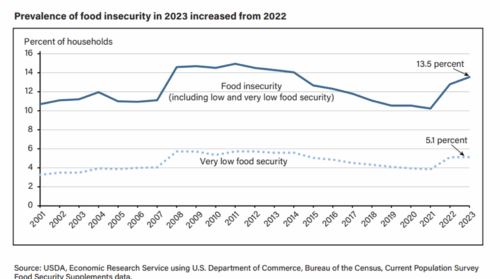I’m on the visionary panel. To register, click here.

According to the Wall Street Journal (sent to me by Lindsey Smith Taillie, who is quoted in the story), the USDA will no longer be collecting data on food insecurity after this year.
“This nonstatutory report became overly politicized and upon subsequent review, was unnecessary to carry out the work of the Department,” USDA spokesman Alec Varsamis said.
He added that the 2024 report will be released on Oct. 22, but the 2025 report has been discontinued.
I then received USDA’s official notice.
|
Costly and politicized, yes. But redundant and fear-mongering? Hardly.
It’s easy to understand this kind of rhetoric.
The last report, Household Food Security in the United States in 2023, published this extremely inconvenient finding.

It’s pretty hard to justify cutting food assistance funding when food insecurity is rising to levels like those in the 2008 recession.
Cuts and changes to SNAP are leaving a lot up to states, which will have a hard time with it.
If you live in an Orwellian universe, you can use not measuring to pretend that food insecurity does not exist and certainly that it is not increasing as a result of your policies.
It took a long time for the anti-hunger community to achieve federal documentation of this enormous social problem. I suppose we will now have to go back to the old days of local anti-hunger reports. See my comments (with Sally Guttmacher) on state hunger reports.
Truly, we are living in Orwellian times. May we find our way out of them soon.